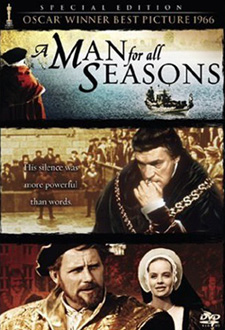

Reviews of Recent Independent, Foreign, & Documentary Films in Theaters and DVD/Home Video
Produced & Directed by: Fred Zinnemann. Written by: Robert Bolt, based on his play. Music by: George Delerue. Released by: Sony Pictures Home Entertainment. Country of Origin: UK. 120 min. Rated G. With: Paul Scofield, Wendy Hiller, Leo McKern, Robert Shaw, Orson Welles, Susannah York, Nigel Davenport, John Hurt & Corin Redgrave. DVD Features: "The Life of Saint Thomas More" featurette. Trailers. English & French audio. English, French & Portuguese subtitles. In the documentary featurette, three historians offer the CliffsNotes version of Sir Thomas More’s biography, filling in the gaps in director Fred Zinnemann’s showdown between the devout Catholic and Henry VIII after the king’s break with the Church of Rome. (He was more vocal in his opinion of the king’s role within the church than the film would lead you to believe. According to historian Alison Wier, More wrote many subversive works years before his arrest for treason.) Underlying the politics of the day was Henry’s campaign to annul his marriage to Catherine of Aragon, who hadn’t given him a male heir, and marry the younger Anne Boleyn (who briefly appears in the film played by a coquettish Vanessa Redgrave). One matter not addressed in the movie or in the featurette is the larger European gamesmanship of the early Reformation. One reason for Rome’s denial of Henry’s petition was political as much as it was religious. (Catherine was the aunt of Holy Roman Emperor Charles V, who had occupied Rome, wielding power over Pope Clement VII.)
Adapting his own play, Robert Bolt’s script plunges the viewer immediately into the Tudor turmoil, emphasizing More’s moral dilemma. Ted Moore’s
Academy-Award winning cinematography makes great use of the English countryside and the monarch’s Hampton Court Palace. But mostly,
the film is one long debate. Waiting for More’s breaking point provides the only thread of suspense, while Paul Scofield’s More remains unflappable, unwilling to forsake his conscience to the changing cultural landscape. Anti-climatically, Zinnemann staged More’s treason trial in wide shots (even his reaction to his death sentence), muting the film’s impact.
Kent Turner
|